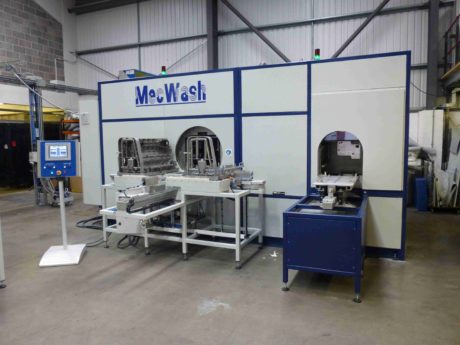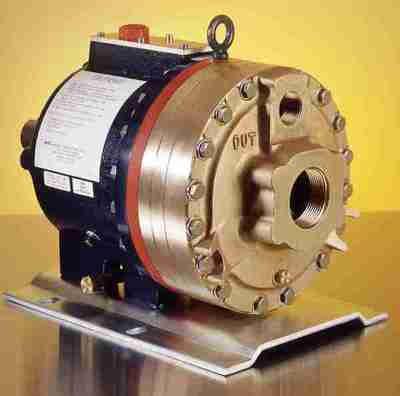 MecWash moves into high pressure for Indian truck plant. UK cleaning machine specialist meets “toughest assignment” with a flexible approach.
MecWash moves into high pressure for Indian truck plant. UK cleaning machine specialist meets “toughest assignment” with a flexible approach.
Two bespoke cleaning units built by UK cleaning machine specialist MecWash Systems for a major truck manufacturer in India are the first-ever MecWash machines to include high-pressure low-volume washing in their cleaning capability.
The first machine, for cleaning cylinder heads, is already in operation. The second and larger machine, for cleaning engine blocks, was shipped in July 2013. Each incorporates a high-pressure cleaning system fed by a seal-less Wanner Hydra-Cell pump, delivering water and detergent at 80°C temperature and a pressure of 40 bar.
This is a radical step, taken in response to what one project engineer termed a double challenge:
«Probably our toughest cleaning assignment so far, combined with the most demanding cleanliness specification we have been asked to meet.»
The company manufactures systems that clean, degrease and remove swarf from small or large engineering components after machining. MecWash has been satisfying the needs of individual customers across a global market for 20 years. Typically each unit is purpose-designed, not only to match cleaning and drying requirements but also to ensure that it is equipped for easy integration into the customer’s production process.
MecWash does not use solvents in its cleaning systems, basing them instead on environmentally preferred aquaeous solutions – water and detergents. Nor previously has the company chosen to use high pressure, even for cleaning narrow passages such as oil and fuel ways. MecWash systems have relied on the flooding effect of large volumes of cleaning solution pumped and sprayed at low-pressure.

Similar requirements, though to an exceptionally high level, apply to the cylinder heads and engine blocks produced by the truck manufacturer in India. But the scale and complexity of these truck-engine components, as well as the amount of swarf to be removed, prompted MecWash to review its normal practice.
With narrow internal galleries 1.5 metres in length and some 500 grammes of metal swarf to be shifted from each engine block, it was not practical to rely wholly on low-pressure flooding or spraying. Long, narrow bores would need jetting at higher pressures.
MecWash chose the Wanner Hydra-Cell pump
To deliver hot cleaning liquid at the required 40 bar pressure MecWash chose the Wanner Hydra-Cell; a type of pump known to be successful on similar applications. In common with piston-plunger and other seal-reliant types of positive displacement pump it could operate continuously at high pressures, 70 bar or above. However its unusual design, with no dynamic seals, also ruled out seal wear: a major threat to long-term reliability of seal-reliant pumps on systems that would be working on 24/7 continuous duty for long periods.
Water is a poor seal lubricant, and the threat of wear increases with pressure and liquid temperature. Without regular maintenance and prompt seal replacement there is the underlying consequence of reduced operating performance, potentially more serious than costly repairs.
Free of these limitations, the Hydra-Cell has other practical advantages on this application.
Simple and compact structure
The structure is simple and compact, reducing “footprint” and the cost of spares. Maintenance is minimal. The pumps are energy efficient. They can be run dry without damage, in the event of a blocked filter or other inlet problem.
With three hydraulically-balanced diaphragms combined in a single head, liquid is pumped smoothly and without stress regardless of discharge pressure. The diaphragms also totally separate wetted parts from the permanently lubricated drive end of the pump, allowing it to handle non-lubricating liquids (and even abrasive solids, though MecWash carefully filters its water systems).
MecWash has adopted a 2-chamber approach in the design of the systems for India. The machines for cylinder heads and blocks are identical to one another in principle and operation. Each machine has a chamber for high-pressure cleaning of the internal oil and fuel ways and a second chamber for general low-pressure wash, rinse and dry. High and low pressure cycles each take 6 minutes but they run simultaneously, which means a new block, thoroughly cleaned, washed and dried, is produced every 8 minutes – if 2 minutes is allowed for loading and transfer.
Cleaning impact in the first chamber is achieved by means of carriage-mounted long, retractable spray lances, moving through narrow passages to target the network of oil and fuel ways with high-pressure jets at close range. All is planned and positioned for maximum impact, precise targeting and efficient swarf removal.
In the second chamber the block, revolving in a fixture, is put through an intensive 6-minute cycle of general cleaning, comprising spray wash, flood wash, drain, spray rinse, flood rinse, drain, hot air dry and vacuum dry.
All water used is recycled, filtered down to 30 microns (wash) or 10 microns (rinse) and re-used.
Pumping duties are shared between centrifugal pumps for low-pressure high-volume work and the Hydra-Cell pumps (model G25 on the cylinder head machine, G35 on the block cleaning machine). The centrifugal pump on the block machine, with 18.5kW motor is operating at pressures ranging from 1-5 bar and delivering 1500 l/min. The G35, with 11kW motor, is working at 40 bar pressure and delivering 125 l/min.
Having completed pre-shipment tests in the UK, the machine was scheduled for installation on site in India under the supervision of the MecWash commissioning team. Specialist pump support there is also available from Wanner’s long-established Hydra-Cell Partner in India, Machinomatic Engineers.
For sales and technical support for Hydra-Cell pumps in Italy, contact Asco Pompe Srl



